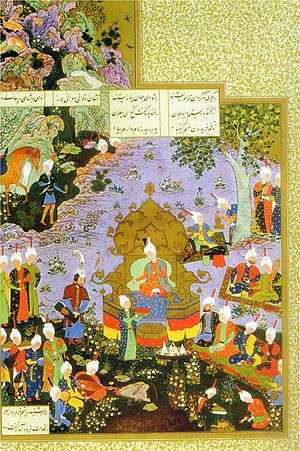Abu-Mansur Daqiqi
Abu Mansur Muhammad Ibn Ahmad Daqiqi Tusi (935/942-976/980:[1] Persian: ابو منصور محمد بن احمد دقیقی), sometimes referred to as Daqiqi (also Dakiki, Daghighi, Persian: دقیقی), was an early Persian[2] poet who is said to have been born in Tus[3][4] in Iran; or in Balkh,[5] located in modern-day Afghanistan; as well as in Samarqand or Bukhara, both in today's Uzbekistan and Marv in today's Turkmenistan.[6]
Daqiqi wrote an epic history of Iran which is begun by history of Zarathushtra and Gashtasb. Questions have been raised as to whether Daqiqi harbored some Zoroastrian beliefs, or was simply promoting Sassanian cultural trends in the wake of Samanid domination.[7] Nevertheless, he is viewed to have been a Zoroastrian convert to Islam.[8] A large number of couplets by him were included in the epic Shahname (Book of Kings) by the Persian epic poet Ferdowsi. Daqiqi was murdered by his favorite slave.[9]
Some scholars speculate that Daqiqi wrote more, but the content was too controversial to be included in Shahname and later lost. Other poems by him have survived, published, among others, in Le premier poet Persan by G.Lazard.
Notes
- ↑ Sources vary, treat all dates as estimates.
- ↑ Annemarie Schimmel, A two-colored brocade: the imagery of Persian poetry, University of North Carolina Press, 1992, ISBN 0-8078-2050-4, p. 116
- ↑ Khaleghi-Motlagh, D. (1993). "DAQĪQĪ". Encyclopaedia Iranica. 6.
Various biographers have named Bukhara, Samarqand, Balḵ, Marv, and Ṭūs as his birthplace; according to Moḥammad ʿAwfī (..), it was at Ṭūs, and for several reasons his report seems more probable.
- ↑ Zabihullah Safa /Tarikh-e adabiat-e Iran / P409
- ↑ Daqiqi is always known as Daqiqi Balkhi. He was born in Balkh. Here's an article of Dr. Nasrullah Poorjawadi, an Iranian writer and scholar LINK Archived December 20, 2007, at the Wayback Machine.
- ↑ http://www.iranicaonline.org/articles/daqiqi-abu-mansur-ahmad-b
- ↑ Humanism in the Renaissance of Islam, by Joel L. Kraemer, pg. 92
- ↑ E.J. Brill's first encyclopaedia of Islam, 1913-1936, Volume 2 By Martijn Theodoor Houtsma, pg. 100
- ↑ Classical Persian Literature, by Arthur John Arberry, pg. 41
Further reading
- Annemarie Schimmel; A Two-Colored Brocade: The Imagery of Persian Poetry; University of North Carolina Press (November, 1992); ISBN 0-8078-2050-4
- B. W. Robinson, The Persian Book of Kings: An Epitome of the Shahnama of Firdawsi; Curzon Press (April, 2002); ISBN 0-7007-1618-1
- A. J. Arberry; Classical Persian Literature; Routledge/Curzon; New Ed edition (January 31, 1995); ISBN 0-7007-0276-8
- E.G. Browne. Literary History of Persia. (Four volumes, 2,256 pages, and twenty-five years in the writing). 1998. ISBN 0-7007-0406-X
- Jan Rypka, History of Iranian Literature. Reidel Publishing Company. 1968 OCLC 460598. ISBN 90-277-0143-1
- Encyclopedia Iranica, "Daqiqi", Jalal Djalal Khaleghi-Motlagh
- Ashk Dahlén, He addressed the Kayānian king: “I am a prophet!” – The Image of Zoroaster in the Dāstān-e Goshtāsp (Tale of Goshtāsp), Orientalia Suecana, vol. 60, Uppsala, 2011.
See also
External links
- Abu-Mansur Daqiqi entry in Encyclopaedia Iranica


.png)